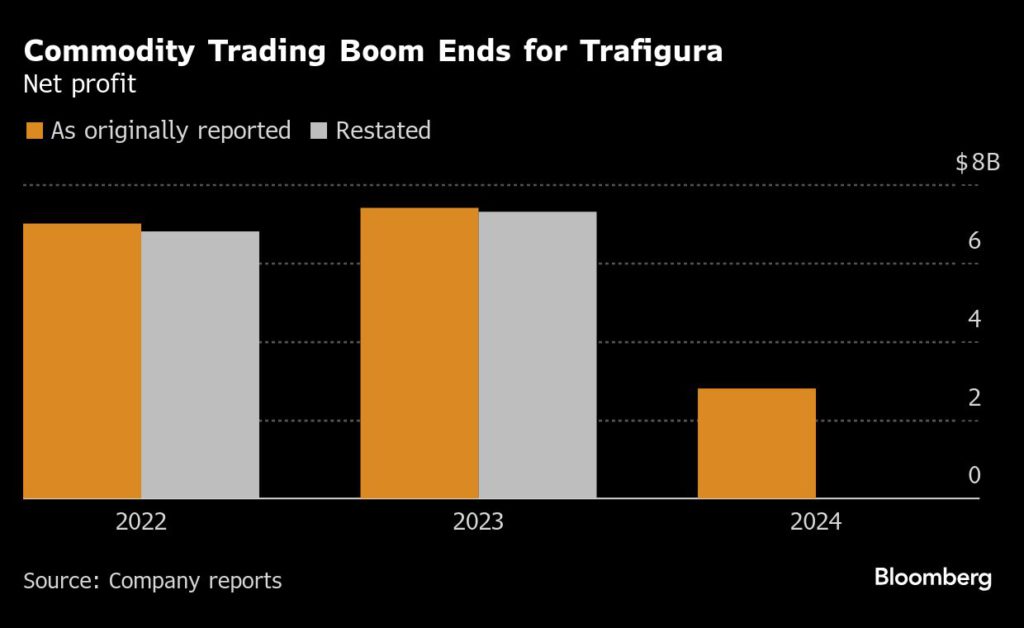Trafigura profit drops 62% after ‘massive problem’ in Mongolia

Trafigura Group reported a sharp drop in profit as it took $1.1 billion in losses related to alleged employee misconduct in its Mongolian oil business.
The Mongolia losses mean Jeremy Weir’s tenure as chief executive officer at one of the world’s largest commodity traders is ending on a sour note, with Trafigura forced to restate several years of prior accounts. Weir will hand over to gas and power head Richard Holtum on Jan. 1, after more than a decade at the helm.
Bloomberg first reported that Trafigura was facing sizable losses in its Mongolian oil business in February; in October, the company confirmed that it had uncovered alleged wrongdoing by its own employees and was planning to take a $1.1 billion provision.
The company – which is entirely owned by its employees – reported net profit of $2.8 billion for its 2024 financial year that ended in September, down 62% from the previous year and the lowest in four years.
That included $357.5 million of losses due to the alleged Mongolia fraud, with the remainder being spread across several previous years. If Trafigura had applied the full Mongolia loss to its 2024 accounts, net profit would have been about $2 billion. The company did not say how many years of its accounts it was restating, but has said that the suspected Mongolia wrongdoing took place over approximately five years.
The company also took a $297 million hit on its struggling zinc smelting business Nyrstar, as well as smaller impairments on its retail fuel business Puma Energy and its Colombian logistics business. The trading house continued to benefit from a very low tax bill — its effective tax rate in 2024 was just 2.8%, down from 8% the prior year.
While Trafigura’s net profit was the lowest in four years, it remained strong by comparison to the trading house’s performance before the Covid pandemic and energy crisis transformed the industry’s fortunes.

In a video accompanying the results, Weir hailed Trafigura — where he will remain as non-executive chairman — as a “very different organization” from the one he took over a decade ago, and said it had become a “major powerhouse in the commodity supply chain business.”
Chief Financial Officer Stephan Jansma in the same video described the Mongolia losses as “a massive problem for us.” Weir said that the company was taking a range of remedial actions to improve its controls, and that these would be subject to external review.
The impairments cap a tumultuous period for Trafigura, in which it has pleaded guilty in a US court to historical corruption in Brazil, settled allegations it manipulated oil prices, and become the first commodity trading house ever to stand trial in Switzerland on corruption charges.
At the same time, the company has undergone a wholesale management succession, with the departure of senior executives including long-time head of oil Jose Larocca, former chief financial officer Christophe Salmon, and Mike Wainwright, the former chief operating officer who is also a defendant in the Swiss corruption case. (Wainwright, through his lawyer, has denied the charges against him in Swiss court this week.)
Trafigura paid $2 billion in dividends in the year, down 66% from the previous year. The dividends are used to buy back shares from employees, and Bloomberg last month reported that the company is reducing buybacks this year.
Trafigura said that the underlying performance of its commodity trading teams had been robust. It singled out the metals division for praise, highlighting a “very strong” performance from its copper traders.
Equity was $16.3 billion – down slightly compared to the $16.5 billion it earlier reported for the previous year, although that number has now been revised lower.
(By Archie Hunter and Jack Farchy)
{{ commodity.name }}
{{ post.title }}
{{ post.date }}




Comments